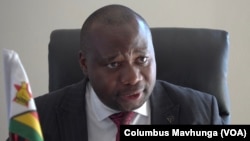The International Monetary Fund has asked Zimbabwe to rein in corruption — said to be costing the economy billions of dollars each year — while giving some rare praise for the country’s new currency, the most stable Zimbabwe has seen in years.
Following a recent mission to Zimbabwe, the IMF says the country’s new Zimbabwe Gold currency, or ZiG, has ended a bout of macroeconomic instability that saw the preceding currency, the Zimbabwe dollar, suffer radical depreciation, causing prices to skyrocket.
The IMF said that if macro-stabilization is sustained, cumulative inflation for the remainder of the year would be about 7% — a figure Zimbabwe has not achieved in years.
In an interview with VOA, Persistence Gwanyanya, a member of the Reserve Bank of Zimbabwe Board, welcomed the IMF’s report for acknowledging that the country’s new currency had stabilized the economy.
“We think that there has been some notable improvements with regards to … fiscal accountability,” Gwanyanya said. “Whilst there are isolated cases of corruption that we acknowledge, the overall picture is that there has been significant improvement in fiscal management in the country. And unsurprisingly, we continue to improve. But to achieve the ambitions, we reduce the leakages, we improve … accountability further in the economy.”
In the report, the IMF said Zimbabwe’s economic governance still has significant weaknesses, and said corruption poses a risk to economic performance that needs to be addressed.
Last month, Zimbabwe’s prosecutor general, Loice Matanda-Moyo, also the former head of the anti-corruption commission, said corruption costs the country nearly $2 billion annually, devastating the economy and ordinary citizens.
The Zimbabwe Anti-Corruption Commission says it is investigating a case from last year in which the electoral commission reportedly paid $1.2 million for a server it could have bought on the open market for less than $25,000. The money went to a company owned by an ally of President Emmerson Mnangagwa.
Godfrey Kanyenze, an economist and founding director of the Labour and Economic Development Research Institute of Zimbabwe, said reducing corruption is crucial if the country’s economy is to improve.
“Corruption is a cancer that has to be dealt with, we need political will to address this particular issue and there is to be a price to corrupt activities. The culture of impunity must be replaced by zero tolerance for corruption, as is the case in other countries where the state has played a leadership role,” Kanyenze said.
Steven Dhlamini, an economics professor at National University of Science and Technology, said the IMF report addressed all issues that Zimbabwe needs to get on track.
“Overall, it is a very positive report, it confirms that our policy trajectory is on the right path and we are hopeful that authorities are going to continue implementing these policy measures that have been commenced since last year,” Dhlamini said.
In its report, the IMF said Zimbabwe’s economy is showing “resilience” even as effects of the El Nino drought were being felt. The economy is expected to grow 2 percent in 2024, down from 2023’s 5.3%.




